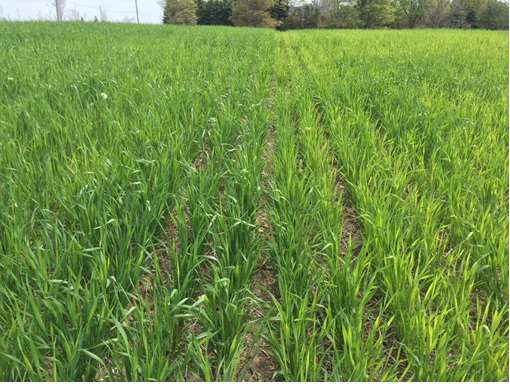Symptoms include yellowing of younger leaves
By Diego Flammini
Assistant Editor, North American Content
Farms.com
Some winter wheat fields across Ontario could be suffering from sulfur deficiency, according to OMAFRA’s May 25 Field Crop Report.
Sulfur deficiency presents differently than nitrogen deficiency.
Sulfur deficient wheat “appears as (the) yellowing of younger leaves, in contrast to nitrogen deficiency, where older leaves yellow first,” OMAFRA said in its report.
Producers applying foliar sulfur have seen variable responses, depending on soil and weather conditions.

Sulphur deficiency symptoms in winter wheat appear as the yellowing of younger leaves.
Photo: OMAFRA
“Sulfur is released to the soil from the breakdown of organic matter, so soils with low organic matter levels or coarse texture are more likely to be deficient,” OMAFRA said.
Aside from sulfur issues, the Ontario winter wheat crop is moving along well. A majority of the crop is between the early flag leaf and swollen boot stage.
And some fields have headed in Essex County.
With respect to spring cereals, the crops appear to be progressing nicely, but earlier rains have made some fields patchy and susceptible to crusting, says the Field Crop Team.
Corn
Farmers have planted between 90 and 95 per cent of the provincial corn crop, according to OMAFRA.
Early-planted corn is at the one to two leaf stage in Ridgetown.
However, in Niagara, where heavy clay soils remain unfit, farmers have planted only about 25 per cent of corn.
There’s less than a week for corn planting before corn yield potential drops below 90 per cent, according to OMAFRA.
Soybeans
Farmers have planted about 30 per cent of Ontario’s soybean crop. Some producers may increase their acreage if they are unable to plant their corn.
Some farmers are managing soil crusting in early-planted crops. A light pass with a harrow or rotary hoe could help break up the soil, OMAFRA said.
Herbicides should be applied before emergence for proper weed control, especially of Canada fleabane.
Farmers have planted almost 50 per cent of the provincial canola crop. When it comes to edible beans, most fields won’t be ready for planting for another week, OMAFRA said.